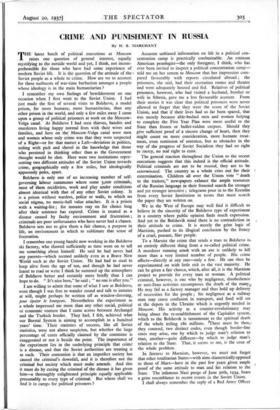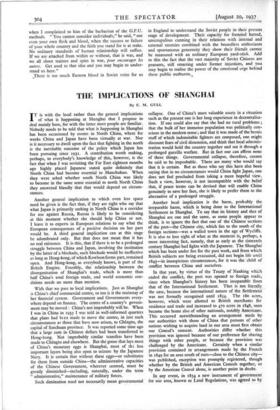CRIME AND PUNISHMENT IN RUSSIA
By H. S. MARCHANT
THE latest batch of political executions at Moscow raises one question of general interest, equally mystifying to the outside world and yet, I think, not incom- prehensible for those who have had some experience of modern Soviet life. It is the question of the attitude of the • Soviet people as a whole to crime. How are we to account for these outbursts of war-time barbarism amongst a people whose ideology is in the main humanitarian ?
I remember my own feelings of bewilderment on one occasion when I first went to the Soviet Union. I had just made the first of several visits to Bolshevo, a model prison, far more humane, more humanitarian, than any other prison in the world, and only a few miles away I came upon a group of political prisoners at work on the Moscow- Volga canal. At Bolshevo I had seen thieves, bandits and murderers living happy normal lives with their wives and families, and here on the Moscow-Volga canal were men and women whose only crime was that they were suspected of a Right—or for that matter a Left—deviation in politics, toiling with pick and shovel in the knowledge that those who persisted in thinking other than as the Government thought would be shot. Here were two institutions repre- senting two different attitudes of the Soviet Union towards crime, geographically only a few miles, but ideologically apparently poles, apart.
Bolshevo is only one of an increasing number of self- governing labour communes where some 3,000 criminals, most of them recidivists, work and play under conditions almost identical with that of any other Soviet colony. It is a prison without warders, police or walls, to which no social stigma, no music-hall value attaches. It is a prison with a waiting-list ; for inmates stay on for choice long after their sentence has expired. Crime is treated as a disease caused by faulty environment and frustration ; criminals are poor unfortunates who have never had a chance. Bolshevo sets out to give them a fair chance, a purpose in life, an environment in which to sublimate that sense of frustration.
I remember one young bandit now working in the Bolshevo ski factory, who thawed sufficiently as time went on to tell me something about himself. He said he had never had any parents—which seemed unlikely even in a Brave New World such as the Soviet Union. He had had to steal to keep alive from the age of ten, and though he had never learnt to read or write I think he summed up the atmosphere of Bolshevo better and certainly more briefly than I can hope to do. " It's nice here," he said ; " no one is after you."
I am willing to admit that some of what I saw at Bolshevo, even though I was free to wander round and talk to inmates at will, might perhaps be written off as window-dressing, pour epater le bourgeois. Nevertheless the experiment as a whole impressed me more than any other social, political or economic venture that I came across between Archangel and the Turkish border. They had, I felt, achieved what our Borstal System is aiming to accomplish in a hundred years' time. Their statistics of success, like all Soviet statistics, were not above suspicion, but whether the large percentage of cures officially claimed by the commune is exaggerated or not is beside the point. The importance of the experiment lies in the underlying principle that crime is a disease, and that the Soviet authorities are treating it as such. Their contention is that an imperfect society has caused the criminal's downfall, and it is therefore not the criminal but society which must make amends. And this it must do by curing the criminal of the disease it has given him—a thoroughly enlightened principle equally applicable presumably to every type of criminal. But where shall we find it in camps for political prisoners ? Accurate unbiased information on life in a political con- centration camp is practically unobtainable. An eminent American penologist—the only foreigner, I think, who has ever been invited to inspect a political concentration camp— told me on her return to Moscow that her impression com- pared favourably with reports circulated abroad ; the prisoners, she said, had their recreation rooms and theatre and were adequately housed and fed. Relatives of political prisoners, however, who had visited a husband, brother or wife in Siberia, gave me a less favourable account. From their stories it was clear that political prisoners were never allowed to forget that they were the scum of the Soviet Union, and that if their lives had so far been spared, that was merely because able-bodied men and women helping to complete the Five Year Plan were more useful to the State than frozen or bullet-ridden corpses. Should they give sufficient proof of a sincere change of heart, then they might count on more consideration, more humane treat- ment, even remission of sentence, but as obstacles in the way of the progress of Soviet Socialism they had no right to mercy, no real right to exist.
The general reaction throughout the Union to the recent executions suggests that this indeed is the official attitude.
Political criminals are not to be treated, they are to be exterminated. The country as a whole cries out for their extermination. Children all over the Union vote " death to the traitors," newspapers exhaust the ample resources of the Russian language in their frenzied search for stronger and yet stronger invective ; telegrams pour in to the Kremlin from every Soviet Institution in terms that must scorch the paper they are written on.
We in the West of Europe may well find it difficult to believe in the sincerity of the Bolshevo type of experiment in a country where public opinion finds much expression. And yet to the Bolshevik mind there is no contradiction in their attitude to crime. It is merely the grim logic of Marxism, pushed to its illogical conclusion by the frenzy of a cruel, peasant, Slav people.
To a Marxist the crime that sends a man to Bolshevo is. an entirely different thing from a so-called political crime.
A murderer running amok with an axe is unlikely to kill more than a very limited number of people. His crime affects—directly at any rate—only a few. He can then be experimented on with little risk to the vast majority. He can be given a fair chance, which, after all, it is the Marxism project to provide for every man or woman. A political criminal, however, is one who by negligence, disobedience or anti-State activities encompasses the death of the many He may fail as a factory manager and thus hold up delivery of necessities for the people ; his negligence as a railway man may cause confusion in transport, and food will rot at the depots in the Ukraine which is urgently needed in Moscow. His activity as a counter-revolutionary may bring about the re-establishment of the Capitalist system, which to the Bolshevik is tantamount to the spiritual death of the whole toiling 18o millions. rThere must be then,- they contend, two distinct codes, even though border-line cases may arise, one by which to judge man's relation to man, another—quite different—by which to judge man's relation to the State. That, it seems to me, is the crux of the whole problem.
In fairness to Marxism, however, we must not forget that other totalitarian States—with aims diametrically opposed to those of Marx—have in the past few years given ample proof of the same attitude to man and his relation to the State. The infamous Nazi purge of June 3oth, 1934, bears a grim resemblance to recent events in the Soviet Union.
I shall always remember the reply of a Red Army Officer when I complained to him of the barbarism of the G.P.U. methods. " You cannot consider individuals," he said, " not even your own flesh and blood, when the success or failure of your whole country and the faith you stand for is at stake. No ordinary standards of human relationship will suffice. If we are attacked from within or without, that is war, and we all shoot traitors and spies in war, pour encourager les autres. Get used to that idea and you may begin to under- stand us here."
There is too much Eastern blood in Soviet veins for us in England to understand the Soviet people in their present stage of development. Their capacity for frenzied hatred, unscrupulous cunning in their relations with internal and external enemies combined with the boundless enthusiasm and spontaneous generosity they show their friends cannot be measured with an ordinary European yard-stick. Add to this the fact that the vast majority of Soviet Citizens are peasants, still smarting under former injustices, and you may begin to realise the power of the emotional urge behind these public outbursts..,







































 Previous page
Previous page